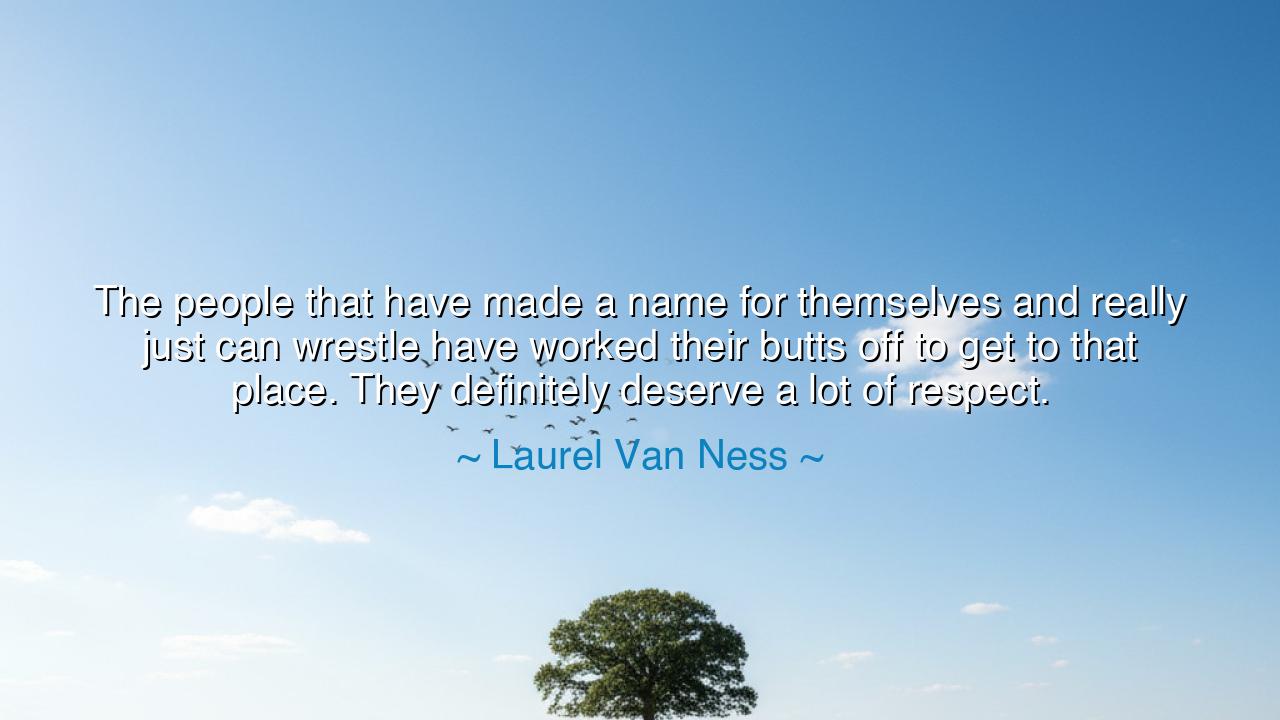
The people that have made a name for themselves and really just
The people that have made a name for themselves and really just can wrestle have worked their butts off to get to that place. They definitely deserve a lot of respect.






When Laurel Van Ness declared, “The people that have made a name for themselves and really just can wrestle have worked their butts off to get to that place. They definitely deserve a lot of respect,” she spoke with the clarity of one who has walked the hard road and knows the weight of sacrifice. Her words shine with both admiration and truth: that greatness is never born of luck alone, but of relentless effort, discipline, and endurance. In a world where fame often comes cheaply, she reminds us that those who truly master their craft earn their glory through sweat and suffering.
The meaning of her words lies in the recognition of labor unseen. To make a name is not merely to be known, but to carve one’s identity through trial and persistence. In the realm of wrestling, where bodies are pushed to their limits and performances demand both physical strength and storytelling skill, the road to success is long, brutal, and unforgiving. Van Ness’s statement honors those who endure this path with integrity — who rise not because of shortcuts or accidents, but because of tireless devotion to their art.
The origin of this truth is ancient. From the days of the Greek Olympics, athletes were revered not only for victory but for the discipline that led them there. The poet Pindar sang of champions who “toiled like oxen beneath the yoke of training,” reminding all that honor was purchased in blood and sweat. Similarly, the gladiators of Rome, though often enslaved, won lasting glory in the arena through skill and unbreakable resolve. Van Ness stands in this same lineage of reverence, pointing out that the true warrior is not simply one who appears in the spotlight, but one who has endured the hidden labor to stand there.
History offers striking examples. Consider Dan Gable, the legendary wrestler who became an icon of American sport. His triumphs on the mat were not accidents of talent but the fruits of relentless practice, often described as training harder than anyone else alive. He made his name not through spectacle alone but through the unyielding devotion to his craft. In the same way, professional wrestlers who rise to stardom often endure years of obscurity, injury, and travel, giving their bodies and spirits to a dream. Their respect is not demanded; it is earned.
Yet Van Ness’s words also warn us against the blindness of dismissing such labor. In every field, there are those who reach heights by endurance, yet their struggles are forgotten once they stand in the light. Too often the crowd sees only the victory, not the countless failures that built it. To truly respect achievement is to recognize the hidden sacrifices that the world does not see: the hours in training, the bruises and scars, the rejections and doubts endured silently.
The lesson here is profound: never envy the visible crown without honoring the invisible cost. Those who “worked their butts off” remind us that all greatness is built in silence before it is revealed in glory. Whether in the ring, the workshop, the classroom, or the battlefield, mastery demands not only talent but perseverance, not only ambition but discipline. To withhold respect from such labor is to dishonor the very essence of human striving.
Practical actions flow from this truth. When you witness greatness, train yourself to look deeper — to see not only the performance but the path that led there. Offer gratitude to those who dedicate their lives to craft and discipline, whether they are wrestlers, teachers, builders, or healers. In your own life, commit to the same standard: embrace the grind, accept the hardship, and understand that true recognition comes not from seeking shortcuts, but from giving all of yourself to the pursuit of excellence.
Thus, Laurel Van Ness’s words stand as a hymn to endurance. They remind us that behind every name carved into the annals of respect is a story of long labor and unseen sacrifice. May we honor those who toil unseen, may we learn from their example, and may we, too, work with such fire and persistence that when our time comes, our achievements will not be questioned, but remembered with respect.






AAdministratorAdministrator
Welcome, honored guests. Please leave a comment, we will respond soon